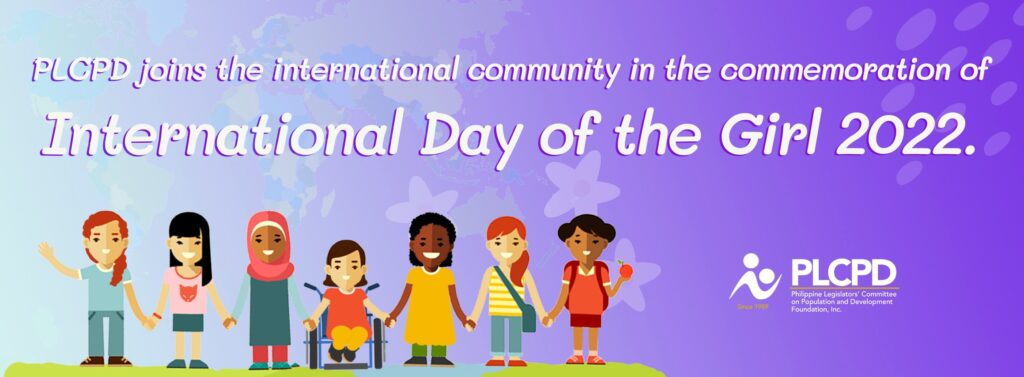This International Day of the Girl: A Call to Prioritize Adolescent Pregnancy Prevention in the 19th Congress

On December 19, 2011, the United Nations adopted Resolution 66/170 to declare October 11 as the International Day of the Girl Child (IDG). The International Day of the Girl Child highlights girls’ rights worldwide and the obstacles that prevent them from being fully realized. The IDG also emphasizes the necessity of addressing the unique challenges girls experience and promoting girls’ empowerment and the attainment of their human rights.
Girls are a significant force for progress and positive change around the world and they are entitled to a life that is secure, well-educated, and healthy. Girls can transform the world if they are empowered and given the right support during their formative and adolescent years.
A Look Back into Our Legislative Gains
Over the years, the Philippines has passed laws on healthcare, reproductive health and rights, prevention of violence against women and girls (PVAWG), and other measures that protect, promote, and fulfill girls’ rights. Among the notable legislative gains in the 18th Congress is the banning of child marriage through the adoption of Republic Act 11596 or the law prohibiting child marriage in the country in December 2021. The new law imposes penalties for those who are involved in as well as facilitating or solemnizing child marriages. Child marriage is a practice that violates the rights of children and has grave consequences that impact every aspect of their lives and their future.
In March 2022, Republic Act 11648 or the law raising the age for determining statutory rape from below 12 to below 16 years old was enacted. The law protects children against sexual abuse and exploitation.
These laws, Republic Act 11596 and Republic Act 11648 are a remarkable fruit of cooperation and work. The collective work in forwarding innovations and solutions to the many challenges that girls face has brought about positive changes in our societies. They will not only prevent violence against women and girls but empower them to reach her full potential by protecting them from violence and harmful practices that violate their rights and hinder their development and self-fulfillment.
We have seen the profound impact it creates when nations or communities work together to uphold girls’ rights and prioritizing their welfare and well-being – time and again, this has proven to be key on the road to progress and sustainability.
Prioritizing the Adolescent Pregnancy Prevention and Continuing Our Work for Girls’ Rights
In commemorating the International Day of the Girl, it is crucial to be reminded of the challenges that remain and the work ahead of us in addressing the challenges of girls. We call on Congress to address its unfinished business act on the Adolescent Pregnancy Prevention bill with urgency.
Former President Rodrigo Duterte on June 25, 2021, signed an executive order (EO) 141 declaring the prevention of adolescent pregnancies and addressing its root causes as a national priority in the Philippines. However, the executive order does not address the gaps in the law and its implementation that have become barriers to children’s access to critical information and services. In our country, which registers a continuous decline in birth rates, it is alarming to see more and more very young adolescents 10-14 years old giving birth per year
When a girl gets pregnant, her life can change radically. An early pregnancy has serious consequences that can affect a girl’s physical and mental health, her development and chances at a bright future, and even her social and economic participation. Early pregnancies, particularly among very young adolescents, are consequences of the failure of society to protect them from harm.
This IDG 2022, we call on Congress to pass the bill addressing adolescent pregnancies by establishing prevention programs and providing social protection for adolescent parents. We call on all sectors of society who have an important role and responsibility in addressing this. It is high time to reaffirm our commitment and act with urgency to prepare a future with no more children having children.
